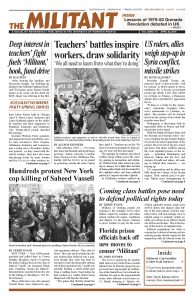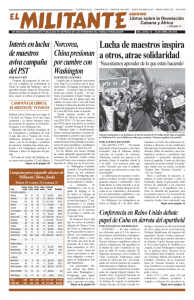The refusal to accept cop brutality and killings has grown among working people in recent years. These murderous assaults are aimed at the working class as a whole and disproportionately hit workers who are African-American. Outrage against this violence builds on the gains of the powerful working-class-led Black rights movement that overthrew Jim Crow segregation in the 1950s and ’60s and the recent round of actions against cop assaults since the killing of Michael Brown in Ferguson, Missouri. Millions around the country were outraged at the police killing of Stephon Clark in Sacramento, California, and Saheed Vassell in Brooklyn, New York.
Cop brutality is endemic to capitalist exploitation. Its role — part of the rulers’ criminal “justice” system — is to intimidate and punish workers.
The number of cops arrested and indicted for murder or manslaughter has risen a bit as protests have taken place in recent years. But Democratic and Republican politicians and the court system work together to ensure that very few police officers are ever convicted.
It will take a more powerful, disciplined working-class-led social movement to win victories in the fight against the brutal and arbitrary violence the cops inflict on our class.
Today’s labor struggles by teachers in West Virginia, Oklahoma, Kentucky and other places are setting an example of how workers can unify and win allies, steeled with a healthy distrust in the capitalist two-party swamp. Workers like these, gaining confidence and increasing class consciousness, set an example and form a pool to win to the fight against police brutality.
As working-class struggles deepen in the years ahead, millions will learn from direct experience with cops and company goons on picket lines and in broad social struggles that the police exist to “serve and protect” the bosses’ class interests. The capitalist rulers seek to defend their profit rates by pushing the crisis of their system onto the backs of working people. They will need their police to keep us in check and cop killings will not end.
When Cuban workers and farmers, led by Fidel Castro and the July 26 Movement, rose up in a mighty revolution to overthrow the U.S.-backed Fulgencio Batista dictatorship and take power, one of the first things they did was to dissolve the government’s cop apparatus and replace it with revolutionary worker combatants. Emulating their example is the road to ridding society of the scourge of police violence.

